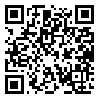Volume 10, Issue 34 (9-2003)
RJMS 2003, 10(34): 283-289 |
Back to browse issues page
Download citation:
BibTeX | RIS | EndNote | Medlars | ProCite | Reference Manager | RefWorks
Send citation to:



BibTeX | RIS | EndNote | Medlars | ProCite | Reference Manager | RefWorks
Send citation to:
Karimi Estahbanati H. FREQENCY OF DIFFERENT SEROTYPES OF PSUDOMONAS AEROGINOSA IN BURNED WOUND INFECTIONS. RJMS 2003; 10 (34) :283-289
URL: http://rjms.iums.ac.ir/article-1-164-en.html
URL: http://rjms.iums.ac.ir/article-1-164-en.html
Abstract: (13666 Views)
Pseudomonas aeroginosa Plays a Prominant role as an etiological agent involved in serious infection in burned Patients. This study analayzed Pseudomonas aeroginosa infections in the “Motahari Burn Center” during four months(from 22Dec.1998 to Apr.1999) in order to estimate their frequency, antibiotic susceptibility and serotyping. 184 positive culture with 205 bacterial strains were isolated among surface swabs or tissue biopsies that were collected in this study period. Pseudomonas was the most common strain(57.07%,n=117) followed by Acinetobacter (16.6%) Ecoli(11.7%),staphylococus aureus(7.8%) and other organisms(6.83%). The frequency of P.aeruginosa resistance to Gentamicin, ceftizoxime, carbenicillin, cephalothin, ceftazidime was over 90%. The most sensitive antibiotics were Amikacin and Tetracyclin. The serotypes isolated from 117 pseudomonas aeruginosa were O:2,O:5, O:6, O:8, O:11,O:12 and O:16.most common serotypes was O:6(20.3%) followed by O:11(18.6%) and O:5(14.4%). most resistant serotypes was O:16(7.6%) and most sensitive was O:8(4.2%).The results showes the difficulty of treatment of this infection with available antibiotics. Therefore prevention is an appropriate means of conquering infection in burned patients. Vaccination with Polyvalent Antiserum against to.O:6. O:11, O:5, O: 8 and O:16 may produce immunity in approximately more than 60% of Burn Patients.
Keywords: Key Words: 1) Burns 2) Wound infection 3) Pseudomona aeroginosa 4) Serotype 5) Antibiogram
Type of Study: Research |
Subject:
Infectious Disease





